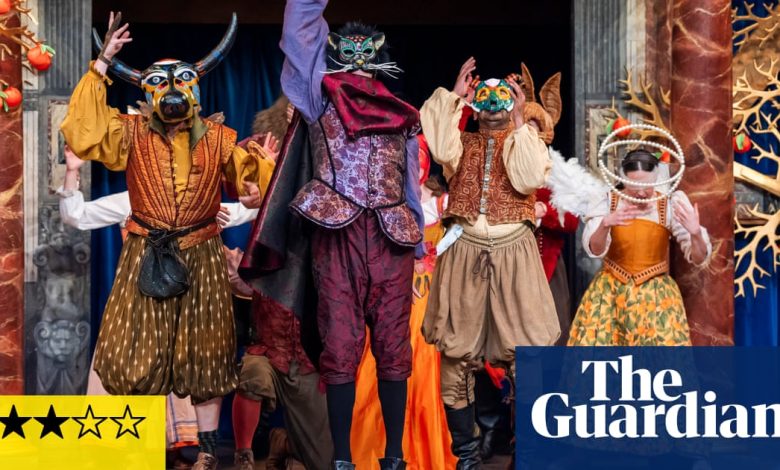Much Ado About Nothing review – frothy fun to please the purists | Stage

[ad_1]
TThe Globe is so often criticized for breaking with tradition, but here’s Shakespeare’s play about love, deceit, male loneliness and female purity that should please the purists. His comedy is delivered straight, so to speak, complete with Elizabethan-era costumes that contain the production’s biggest wow factor.
The masquerade ball in which the masked Don Pedro (Ryan Donaldson) woos Hero (Lydia Fleming) on Claudio’s behalf is a marvel to behold. There are intricate and exquisite animal themed beaks, manes and feathers that look like a charmingly surreal 16th century fantasy come to life.
But there’s not a whiff of stuffiness in Sean Holmes’ production, which feels light and modern despite the traditional carapace. There is also Elizabethan dancing which, along with the costumes, carries the magic of the era, although the movement is less original outside of the dance choreography.
The war is over and a lovely warm summer euphoria radiates from the set with Mediterranean orange trees climbing the back wall of Grace Smart’s scenic design, along with large scattered baskets of oranges that the characters collect, occasionally peel and eat.
There is also exciting music with instruments that include mandolin along with guitar, accordion and percussion. This musicality is noticeable between scenes and adds a cheeky flavor to the comedy or action with arching sounds that inflate the moment (of tension, romance, intrigue, etc.) rather like a score accompanying a silent film.
Both Amalia Vitale’s quick-witted, fiery Beatrice and Echo Quartey’s endearingly pompous Benedick are fun moments as they exchange comic banter. Although their sizzling love/hate chemistry never fades, you feel the tenderness of their union by the end.
There is a more obvious lack of synergy between the central lovers, Hero and Claudio (Adam Wadsworth), whose romance feels vague. This softens the shock of Claudio’s rejection of Hero, so the play’s uneasy mixture of comedy and near-tragedy brings even greater dissonance. There isn’t a significant enough drop in tone after the aborted wedding, so it continues to feel like a slapstick comedy rather than something more textured.
The comedy comes in primary colors, not delicately plucked from the dialogue, but broadly played and bordering on the spirit of clown pantomime, although the murderous scene in which Benedick is deluded in his awkward romance with Beatrice lacks as much ingenious physical comedy as it could and is solid rather than surprising.
There are problems with pacing, too, and the comedy falls tonally flat in a second act that contains too much plot and not enough time, even though the play is more than two and a half hours long. But the stilted humor of Dogbury (Johnny Broadbent) and his gang is thankfully brief and the production as a whole is magnificently put together.
In the end, it’s joyous summer fare with most of the darkness washed away—a troubled play made frothy and fun.
[ad_2]




